Bayer Leverkusen’s triumph in securing their maiden Bundesliga title ahead of FC Bayern marks a historic moment in the club’s nearly two-century-long existence. Despite perennially finishing as runners-up and enduring the taunts of being dubbed “Neverkusen,” Leverkusen has finally shed the burden of near misses to claim the coveted German championship. This remarkable achievement has not only etched Leverkusen’s name in footballing annals but also sparked global admiration and intrigue.
Central to Leverkusen’s ascent to the summit of German football is the astute squad planning orchestrated by sporting director Simon Rolfes and managing director Fernando Carro. Their meticulous approach to recruitment and development has laid the foundation for success, cultivating a squad brimming with talent and potential. This strategic foresight, coupled with the tactical acumen of head coach Xabi Alonso, has propelled Leverkusen to the pinnacle of domestic football, as we will see in this data analysis.
Reflecting on Leverkusen’s journey from sitting in the relegation zone and a humbling 5-1 defeat to Eintracht Frankfurt in October 2022 to clinching the Bundesliga title a mere eighteen months later underscores the transformative power of consistency and a well-assembled squad.
This analysis seeks to unravel the nuances of Bayer Leverkusen‘s recruitment strategy under with data and statistics.
Target Markets
Leverkusen’s historic Bundesliga triumph under Xabi Alonso’s stewardship undoubtedly stole the limelight, but behind the scenes, the mastermind orchestrating the club’s ascent was sporting director Simon Rolfes. While Alonso’s tactical brilliance propelled the team to new heights on the pitch, Rolfes played an equally pivotal role in shaping the squad that clinched Leverkusen’s first-ever league title.
Fernando Carro, Leverkusen’s managing director since 2018, acknowledges the indispensable contributions of both Rolfes and Alonso in the club’s success. He emphasises the importance of every facet of the organisation operating at peak efficiency, from behind-the-scenes efforts to the visible impact on the pitch.
In an interview, Rolfes provided insight into Leverkusen’s approach to squad planning, highlighting the club’s clear positioning and targeted recruitment strategy. Leverkusen meticulously identifies players who align with their vision of development and growth within a stable environment. The club offers promising talents the opportunity to thrive and receive significant playing time early in their careers, fostering a culture of ambition and dedication to personal and collective improvement. Leverkusen’s appeal lies not only in financial incentives but also in the promise of meaningful development and competitive opportunities, both domestically and internationally.
Indeed, Leverkusen’s transfer activity reflects their strategic approach, with acquisitions from key target markets such as England, Spain, Belgium, the Czech Republic, France, and their native Germany. By tapping into diverse talent pools and nurturing young, hungry players, Leverkusen has cultivated a squad brimming with potential and hunger for success.
Squad Development
Alonso’s arrival at Leverkusen saw the integration of several key signings, including Nathan Tella, Victor Boniface, Jonas Hofmann, and Granit Xhaka. However, it’s important to recognise that the core of Leverkusen’s squad predates Alonso’s tenure, with eight of the club’s most utilised players already in place before the Spaniard took charge. This underscores the importance of player development and improvement under Alonso’s guidance rather than relying solely on expensive acquisitions—a strategy often seen in other leagues.
Since Rolfes assumed the role of sporting director in 2018, Leverkusen has made significant investments in player recruitment, totalling €329.6 million. While this figure may seem substantial, it pales in comparison to the spending of perennial Bundesliga giants like Bayern Munich. Leverkusen’s starting XI for their title-clinching victory over Werder Bremen was assembled at a fraction of the cost, highlighting the club’s shrewd transfer strategy under Rolfes’ leadership.
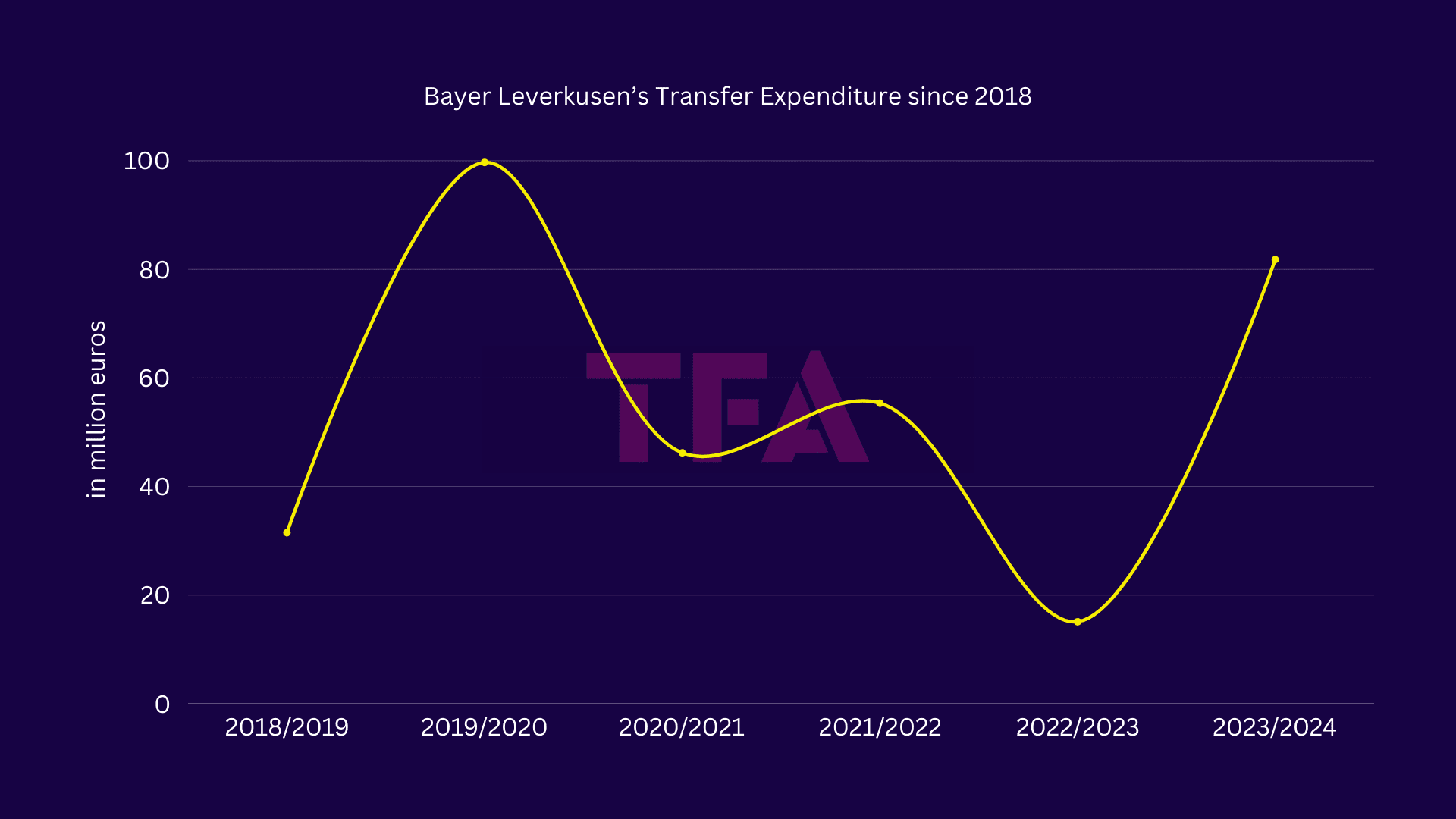
However, signing talented players is only part of the equation; developing them into top performers is equally crucial. Leverkusen’s success lies in their ability to enhance the value of their squad through astute player development. Since Alonso’s arrival, several Leverkusen players have seen significant increases in their market value, with Exequiel Palacios, Alejandro Grimaldo, Jeremie Frimpong, Victor Boniface, and Florian Wirtz all experiencing substantial growth.
In fact, Leverkusen leads the Bundesliga in adding market value to their squad since 2018, with a staggering increase of €190 million. This remarkable growth is a testament to the club’s adept scouting, strategic business in the transfer market, and the transformative impact of Alonso’s coaching philosophy. Leverkusen’s ability to maximise the potential of their players and capitalise on their investments sets them apart as one of the Bundesliga’s most formidable contenders, signalling a new era of dominance for the BayArena faithful.
Strategic Transfers
Bayer Leverkusen’s strategic approach to squad building ahead of the 2023/2024 season exemplified the club’s commitment to addressing key areas of improvement while reinforcing existing strengths. Under Simon Rolfes and his team, Leverkusen identified and secured five intelligent players who have played pivotal roles in elevating the club to the summit of the Bundesliga.
Granit Xhaka’s acquisition addressed the need for a deep-lying playmaker and defensive midfielder capable of evading pressure with composure and efficiency. With a remarkable pressure handling, Xhaka brings a blend of leadership, experience, technical prowess, and tactical understanding, reminiscent of head coach Xabi Alonso. His presence on the pitch has provided Leverkusen with stability and control in midfield.
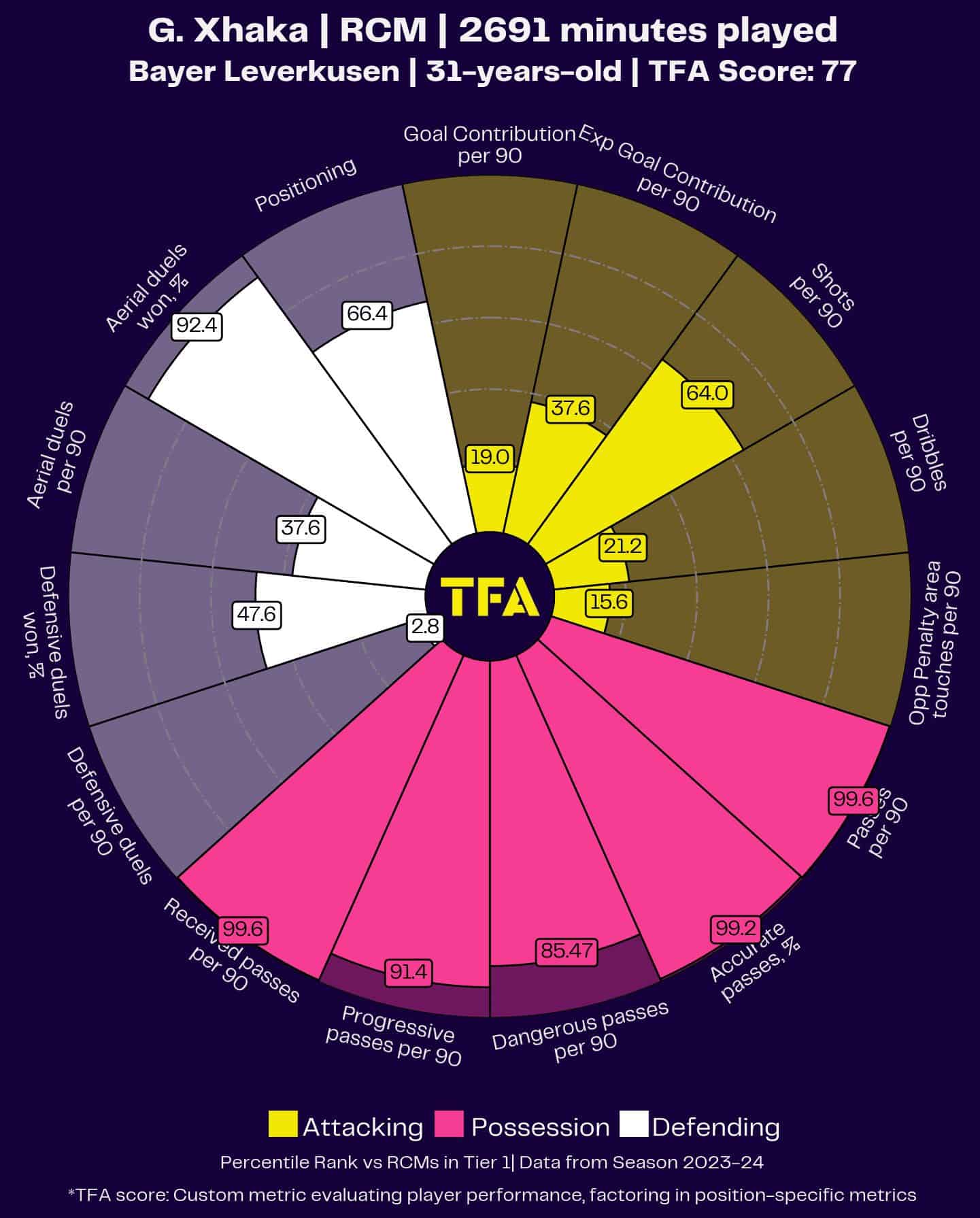
The addition of Alejandro Grimaldo added a new dimension to Leverkusen’s attacking arsenal. The technically gifted left-back not only contributes defensively but also excels in initiating and finishing attacking moves. His telepathic understanding with rising star Florian Wirtz has been instrumental in unlocking opposition defences. At the same time, his knack for scoring crucial goals in pivotal moments has earned him admiration from fans and teammates alike.
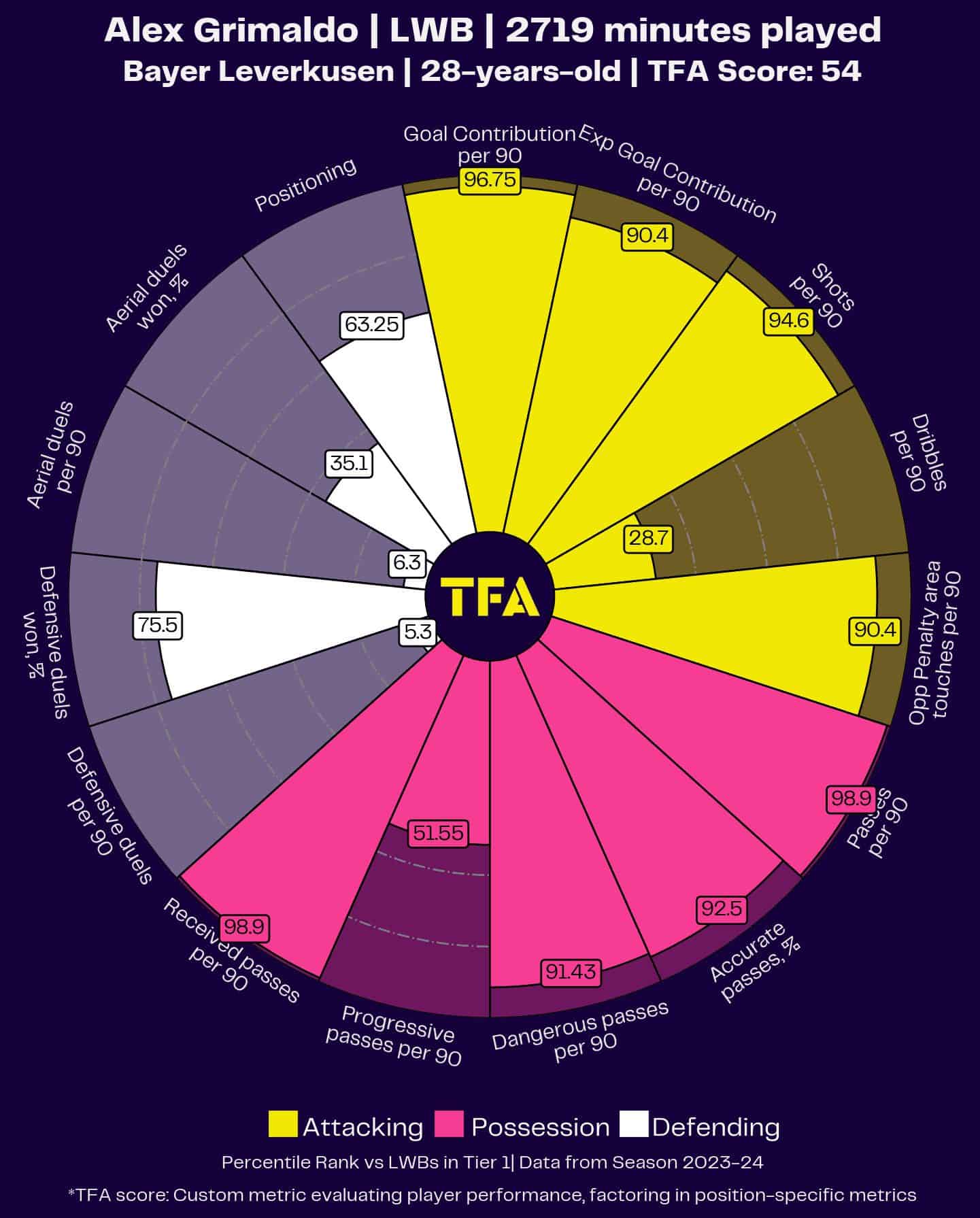
Jonas Hofmann’s arrival brought versatility and tactical intelligence to Leverkusen’s midfield. Hofmann has seamlessly integrated into the team’s tactical setup, adept at pressing off the ball and providing crucial passing options in both central and wide areas. His unselfishness and chemistry with teammates have added a new dimension to Leverkusen’s attacking play, complementing the departures of key players like Moussa Diaby.
Victor Boniface emerged as a dynamic and versatile striker capable of impacting the game in various ways. His ability to hold up play, make incisive runs behind the defence, and contribute to build-up play has made him a valuable asset in Leverkusen’s attacking arsenal. Alongside Grimaldo and Hofmann, Boniface has played a pivotal role in Leverkusen’s early-season success, contributing to the team’s ascent to the top of the Bundesliga table.
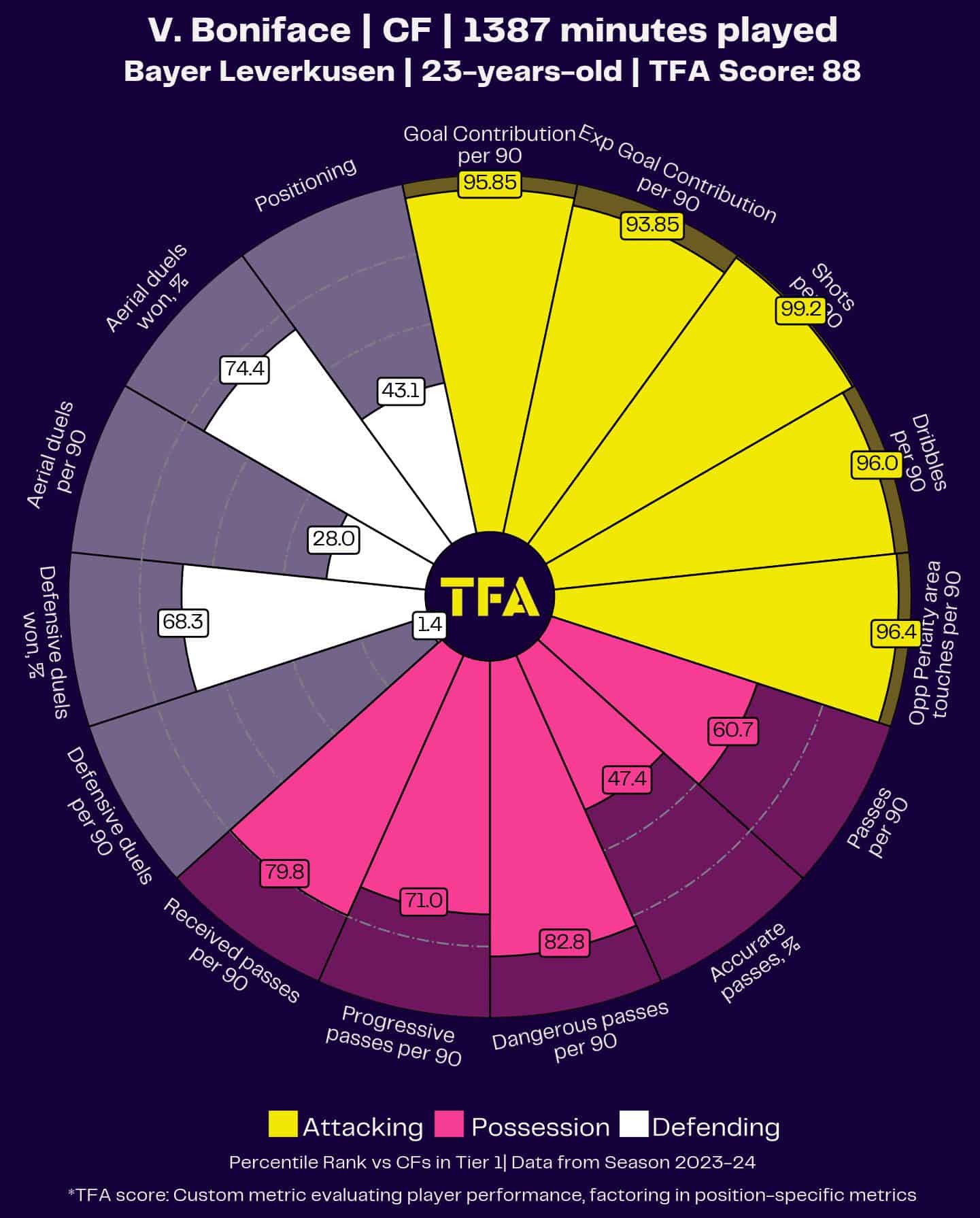
Furthermore, Leverkusen demonstrated foresight and planning with additional signings to bolster squad depth and cover potential absences. Nathan Tella’s arrival provided insurance and depth in case of injuries or departures, while Josip Stanišić was brought in on loan to cover for players participating in international competitions.
Squad Depth and Flexibility
The significance of squad depth cannot be overstated. For Bayer Leverkusen, squad depth has been a cornerstone of their success during the 2023/24 season, enabling them to navigate through various challenges and maintain their momentum on multiple fronts.
In an interview, Rolfes emphasised the importance of balance and depth in the squad, highlighting how it played a crucial role in sustaining their performances even in the face of injuries and setbacks. When key players like Victor Boniface succumbed to injury, others stepped up to ensure continuity and secure results. This collective mentality, prioritising the team’s success over individual accolades, has been a defining characteristic of Leverkusen’s approach under coach Xabi Alonso.
Alonso’s tactical acumen and strategic planning have been evident throughout the season, as he seamlessly executed Plan A in the Bundesliga while simultaneously developing a plan B in the Europa League. Leverkusen’s ability to rotate and adapt their lineup has been instrumental in managing player workload and maintaining freshness across competitions.
One of the key elements of Leverkusen’s squad depth strategy has been the utilisation of fringe players and newcomers in cup competitions. Players like Matěj Kovář, Josip Stanišić, and Juan David Hincapié were given opportunities to showcase their talents and contribute to the team’s success. Alonso’s willingness to trust and rotate his squad not only provided valuable game time for peripheral players but also fostered a sense of competition and camaraderie within the team.
Furthermore, Leverkusen’s depth allowed them to rest key players like Florian Wirtz, Jonas Hofmann, and Victor Boniface without compromising on performance. This rotation policy not only preserved the energy and freshness of key players but also provided invaluable experience and development opportunities for emerging talents like Nathan Tella, Amine Adli, and Adam Hložek.
Leverkusen’s success has not only showcased their tactical flexibility on the field but also highlighted the need for strategic adaptability off it. While maintaining key principles of play, such as positional awareness, quick ball progression, and high-intensity pressing, Alonso has demonstrated a willingness to adjust formations and tactics based on the quality of the opposition.
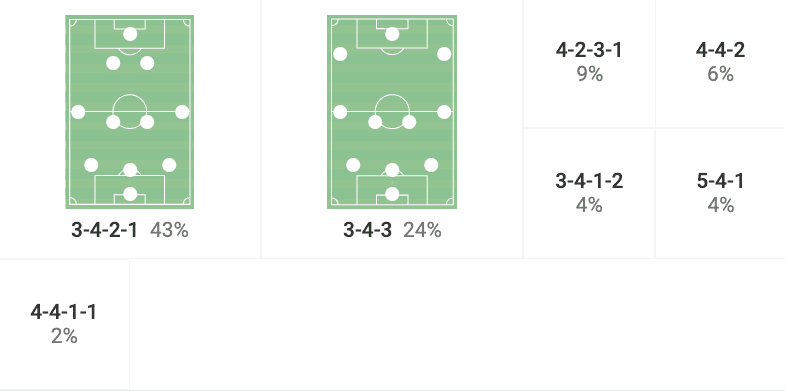
The team’s formation has predominantly been a back four defensively, allowing for stability and compactness out of possession. However, in possession, Leverkusen has maintained a fluid and dynamic approach, with players interchanging positions and creating mismatches for opponents. This versatility has been a critical factor in their success, allowing them to break down stubborn defences and capitalise on transitional moments.
Challenges
As Leverkusen basks in the glory of their historic Bundesliga title, the focus now shifts to the challenges that lie ahead for sporting director Simon Rolfes and his team. One primary task will be capitalising on the newfound success by retaining key players and attracting new talent to further strengthen the squad.
The financial windfall from sponsorships and increased revenue streams presents a golden opportunity for Leverkusen to invest in their squad wisely. With the club’s strong identity and philosophy in player acquisition, they are well-positioned to target individuals who not only possess the requisite talent but also align with the team’s ethos and values. Moreover, Leverkusen’s unbeaten run in the Bundesliga and their impressive performances in Europe have undoubtedly enhanced their reputation on the global stage. This newfound prestige will make them an attractive destination for top talents looking to further their careers and compete at the highest level.
However, amidst the celebrations and accolades, Rolfes and Carro must remain vigilant to the challenges that come with success. The risk of losing key players to larger clubs with deeper pockets looms large, necessitating proactive measures to secure their services or identify suitable replacements.
By leveraging their strong identity and philosophy, the club can continue to build on the foundations laid by Alonso and his team, ensuring that they remain a force to be reckoned with in German football and beyond.
Conclusion
In conclusion, Leverkusen’s squad planning under the guidance of Simon Rolfes and Fernando Carro has been nothing short of exemplary, culminating in their historic Bundesliga title win under the tactical brilliance of Xabi Alonso. Through strategic signings and a keen eye for talent, Leverkusen has assembled a squad that not only possesses quality but also fits seamlessly into Alonso’s system of play.
The emphasis on identifying target markets and signing players who align with the club’s philosophy has paid dividends, with key acquisitions such as Granit Xhaka, Alejandro Grimaldo, Jonas Hofmann, Victor Boniface, and others proving instrumental in their title triumph. Furthermore, Leverkusen’s commitment to squad depth and versatility has been evident throughout the season, allowing Alonso to rotate players effectively and adapt to different tactical scenarios. This flexibility has been crucial in overcoming challenges and maintaining consistency in their performances.
Looking ahead, Leverkusen must now focus on building upon their success and reinforcing their squad to remain competitive in both domestic and European competitions. Retaining key players while also identifying potential targets to fill any gaps will be key priorities for Rolfes and Carro as they seek to build a sustainable and prosperous future for the club.





Comments